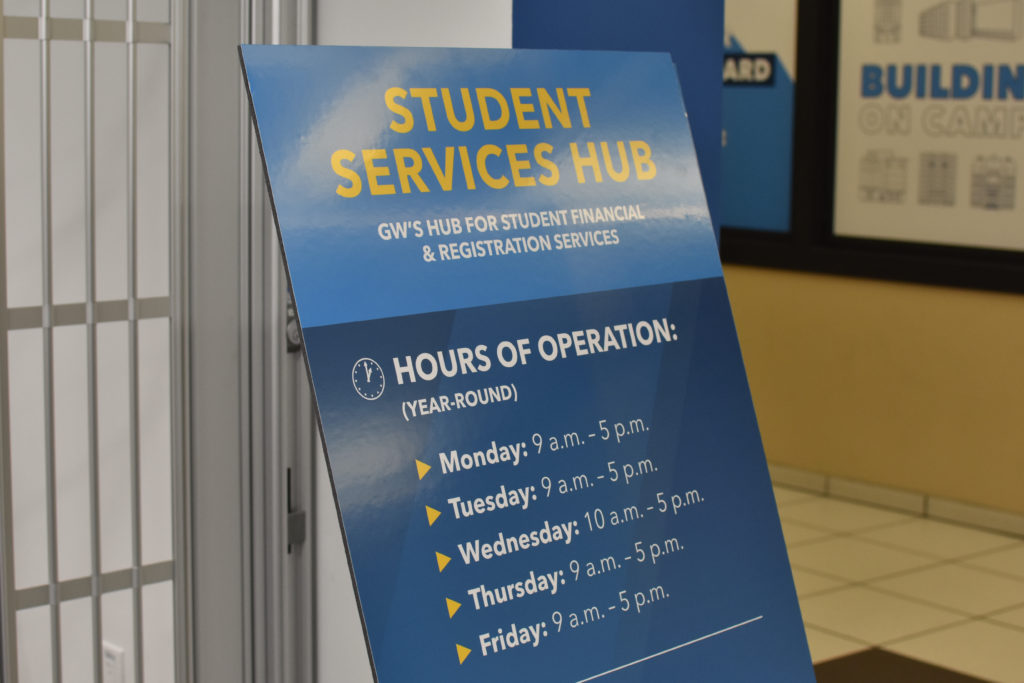Freshman Delia Nelson set aside a few hours per work last semester to dedicate to a federal work-study position, but she did not start a job until January.
Nelson said she received two responses from the 12 applications she submitted between September and November, but she did not get accepted until December and could not finally start until January. She said she now spends up to 15 hours per week at SmartDC, a University-sponsored tutoring partnership with D.C. Public Schools, to make up for the time last semester when she could not secure a job.
Nelson is one of more than 30 students who said officials have taken up to two months to respond to their applications for Federal Work-Study jobs or have rejected their requests. They said the stagnant communication from FWS jobs left them without extra funds and prevented them from racking up the amount they are awarded per academic year.
“Coming here and trying to do work-study and then having the school be so uncooperative with actually assisting students in getting the jobs feels like a slap in the face,” Nelson said.
University spokeswoman Crystal Nosal said a student could be immediately denied from a work-study position if the student was not approved to apply for the position by the University in the first place.
“The two reasons are either that the student answered that they are not approved for FWS or they answered a qualifying question in a way that no longer makes them qualified,” Nosal said in an email.
Bridget Schwartz, the director of student employment, said the Center for Career Services has posted 953 position openings for work-study jobs, 558 students submitted applications and 347 students accepted their offered positions since December 2019.
Schwartz said officials do not limit how many applications a student can submit for work-study jobs, and applications that denote that student has received an FWS award in their financial aid package are not rejected.
“A student is not qualified for a federal work-study job if they have not been offered/did not accept a Federal Work-Study award from the Office of Student Financial Assistance for the relevant academic year,” she said. “Federal Work-Study awards are given solely by the Office of Student Financial Assistance based on the student’s demonstrated financial need.”
Nelson, the freshman working at SmartDC, added that she doesn’t know if she can obtain the full financial reward that a full semester would have provided her because she needs to set aside more time for her studies.
“Work-study is supposed to take minimum hours a week, but especially the system here, people have to overload themselves because it takes so long to get things,” she said. “It’s like you’re setting students up to fail, academic wise and financially.”
Oscar Rios, a freshman studying political science, said he was denied from 45 out of his 47 work-study jobs, did not receive a response from one application and was hired to one earlier in September. Rios said he applied to 47 work-study positions to have a “massive” safety net in case he was not accepted to some.
“They have to do more accommodating for the students that depend on this federal work-study money as part of their financial aid,” he said. “Because if you don’t work, you don’t get that money, you’re missing out on a crucial opportunity.”
Rios said employers took anywhere between two weeks to multiple months to provide any updates on his application status.
The Student Employment office transitioned the posting and hiring system in the fall from Handshake to the Student Employment Talent Management System. The system update aimed to decrease the time between when a student receives a job offer and the official start date.
Tony Peeler Jr., a freshman studying international affairs, said the work-study program is “inefficient” because students who are offered a work-study job opportunity – as stated in their financial aid – are not receiving a job. Peeler said he applied to 12 work-study positions two months ago but has not yet received an offer.
“Everyone should be able to have a job because we’re promised that $3,000 of work-study, and for some people that’s a make or break deal,” Peeler said.
Peeler said career center officials should hire more advisers and create more work-study positions to accommodate students who qualify for the award. He said officials should improve the visibility and advertisement of the new application system and work-study opportunities so students can capitalize on the time they have in the semester to work if they have to apply to positions outside of a work-study job.
Peeler said navigating the new recruitment system after being familiar with Handshake led to confusion and miscommunication between students and officials. He said students are used to the Handshake system, so he is unsure if he is using the new system correctly when submitting an application.
“I guess they tried to make it better with a new website, but that’s just putting a bandaid on it,” Peeler said. “It’s just not really fixing it.”
Tara Suter contributed reporting.








